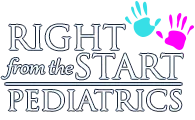
Monitoring your child’s development is an important part of what a pediatrician does. It’s important to visit your pediatrician, because child development is a complex area and needs the expertise of a specialist.
What You Need To Know About Child Development
There are a lot of developmental milestones your child will achieve. A pediatrician can help determine if your child is achieving them at a normal rate, or if there is some delay in development. When a developmental delay is identified, treatment and management can begin.
American Pediatric Association guidelines state that children should have developmental assessments at 9, 18, and 30 months, as part of a routine well-child visit. The pediatrician will also screen your child for autism at 18 and 24 months, during a routine well-child visit. A developmental assessment can happen earlier if your child is:
- Not talking or began talking late
- Having problems remembering things
- Not able to roll over, sit up, crawl, or walk
- Having difficulty with fine motor skills
- Not understanding what others are saying
- Having difficulty problem-solving
- Having difficulty being social with other children
If you notice any of the signs listed above, you should schedule a developmental assessment with the pediatrician. Early identification of developmental issues can lead to earlier treatment and a better outcome for your child.
There are several steps which happen during a developmental assessment. Your pediatrician will:
- Perform a comprehensive review of your child’s illnesses, medications and hospitalizations
- Observe your child’s behaviors, mannerisms, cognitive abilities, emotional, and physical delays
- Provide questionnaires, checklists, and surveys to gather important baseline developmental information
- Interview you and members of your household, your child’s teachers, and others close to your child
Your pediatrician will develop a treatment plan based on the assessment. Your pediatrician may recommend a combination of treatments, including:
- Cognitive exercises
- Medication therapy
- Physical therapy
- Occupational therapy.
To review the American Pediatric Association guidelines for developmental assessment, please click here.
Want To Know More?
To discover more about the role of a pediatrician in early childhood development, call our pediatrician today.








